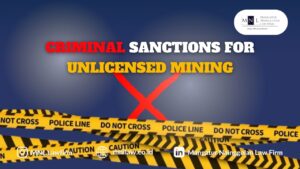
CRIMINAL SANCTIONS FOR UNLICENSED MINING
The Capital City of Nusantara (IKN) has been unsettled by the occurrence of coal mining activities conducted without lawful authorization, resulting in losses to the state amounting to approximately IDR 5.7 trillion. Such mining operations are classified as unauthorized mineral or coal mining (“Unlicensed Mining Operations” or Pertambangan Tanpa Izin, hereinafter “PETI”).
As a matter of fact, PETI undermines energy security and the governance of natural resources. In addition to diminishing state revenue, PETI causes environmental degradation and may precipitate natural disasters that can occur at any time, posing a threat to life and property, particularly to communities in proximity to the mining sites.
Definition of PETI
According to the Ministry of Energy and Mineral Resources of the Republic of Indonesia, PETI constitutes the extraction of minerals or coal by a natural person or legal entity without a lawful license. Such activities disregard statutory requirements and proper mining practices, thereby creating risks of environmental damage, economic destabilization, social disruption, and even civil unrest.
Adverse Impacts of PETI
As published on the official website of the Ministry of Energy and Mineral Resources, PETI has deleterious effects in social, economic, environmental, and occupational safety aspects. Socially, PETI impedes regional development, provokes conflicts among residents, undermines public security, damages public facilities, and engenders various social and public health issues.
Economically, PETI reduces state income from taxation and non-tax state revenue (Penerimaan Negara Bukan Pajak). Environmentally, PETI destroys ecosystems and forests, triggers natural disasters, disrupts agricultural and plantation lands, pollutes rivers, leaves barren lands (voids), and increases the risk of forest fires and spontaneous coal combustion.
From an occupational safety perspective, PETI frequently ignores safety protocols, utilizes unfit equipment, and operates without personal protective equipment. In underground mining, PETI is conducted without adequate ventilation or structural support, thereby creating a substantial risk of fatality for workers.
Criminal Sanctions for PETI
PETI constitutes a criminal offense, as it violates the statutory requirements for a Mining Business License (Izin Usaha Pertambangan – IUP) and a Special Mining Business License (Izin Usaha Pertambangan Khusus – IUPK) as regulated by prevailing legislation. Moreover, PETI disregards the obligations of IUP and IUPK holders, including but not limited to taxation, application of good mining practices, enhancement of added value for resources, and compliance with state revenue and investment financial obligations.
Accordingly, offenders may be subjected to criminal sanctions pursuant to Article 158 of Law No. 3 of 2020 concerning the Amendment to Law No. 4 of 2009 on Mineral and Coal Mining, which provides:
“Any person who conducts mining without a license as referred to in Article 35 shall be punished with imprisonment for a maximum of five (5) years and a fine not exceeding IDR 100,000,000,000 (one hundred billion rupiah).”
Criminal liability extends not only to miners but also to any person who processes, transports, utilizes, or sells the products of PETI. This is provided under Article 161 of Law No. 3 of 2020:
“Any person who stores, utilizes, processes and/or refines, develops and/or utilizes, transports, or sells minerals and/or coal not originating from holders of an IUP, IUPK, IPR (Izin Pertambangan Rakyat), SIPB (Surat Izin Penambangan Batuan), or other licenses as referred to in Article 35(3)© and (g), Article 104, or Article 105, shall be punished with imprisonment for a maximum of five (5) years and a fine not exceeding IDR 100,000,000,000 (one hundred billion rupiah).”
In addition to principal criminal penalties, offenders may also be subjected to ancillary sanctions (additional penalties) in the form of confiscation (forfeiture) of tools or equipment used in committing the offense, confiscation of proceeds derived from the offense, and/or an obligation to pay costs incurred as a result of the offense (vide Article 164 of Law No. 3 of 2020).
Conclusion
PETI is the extraction of minerals or coal by a natural person or legal entity without lawful authorization. PETI, along with the processing, transportation, utilization, and sale of its products, constitutes a criminal act punishable by imprisonment of up to five (5) years and a fine not exceeding IDR 100,000,000,000, in addition to possible ancillary sanctions such as forfeiture of equipment, confiscation of illicit gains, and liability for costs resulting from the offense.
Legal Basis
- Law No. 3 of 2020 concerning the Amendment to Law No. 4 of 2009 on Mineral and Coal Mining.
- Law No. 2 of 2025 concerning the Fourth Amendment to Law No. 4 of 2009 on Mineral and Coal Mining.
Author:
Nicko Surya Arilangga, S.H.
Masta Pasaribu
Editor:
Muhammad Arief Ramadhan,S.H.
